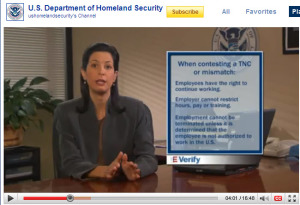Today, DHS Secretary Janet Napolitano and USCIS Director Alejandro Mayorkas announced several new E-Verify initiatives in response to concerns about the program’s overall effectiveness and accuracy. These efforts are designed to increase employer compliance with various E-Verify rules, prevent employment discrimination and deal with identity theft. In particular:
- DHS has entered into an agreement with the Department of Justice whereby the two agencies will share information concerning potential E-Verify discrimination or misuse, which will ultimately bring noncompliant employers under greater scrutiny.
- DHS is setting up an informational telephone hotline for employees seeking E-Verify information or looking to file a complaint about possible discrimination or employer misuse. The hotline number is (888) 897-7781 and will be active beginning April 5, 2010.
- DHS has published training videos on E-Verify procedures and policies, with a particular emphasis on employee rights. The video, which depicts the story of an employee who receives a TNC at work, can be viewed in English and Spanish on YouTube here.
In related news, the DHS publicly defended E-Verify on its blog today, asserting that the system’s accuracy and efficiency continues to improve despite news to the contrary. Lauren Kielsmeier, the Acting Deputy Director and Chief of Staff for USCIS, points out that just 3.3% of the overall population studied by Westat (the independent evaluation firm) was incorrectly found to be work authorized. She also writes that USCIS is planning additional enhancements to E-Verify such as adding U.S. passports to the photo tool and working with states to access state driver’s license data. USCIS is also planning to launch a pilot program to explore the use of biometric or biographic-based verification.
Latest stats: more than 192,000 participating employers at more than 705,000 worksites nationwide currently use E-Verify to electronically verify their workers’ employment eligibility. Since Oct. 1, 2009, E-Verify has processed more than six million queries.
